
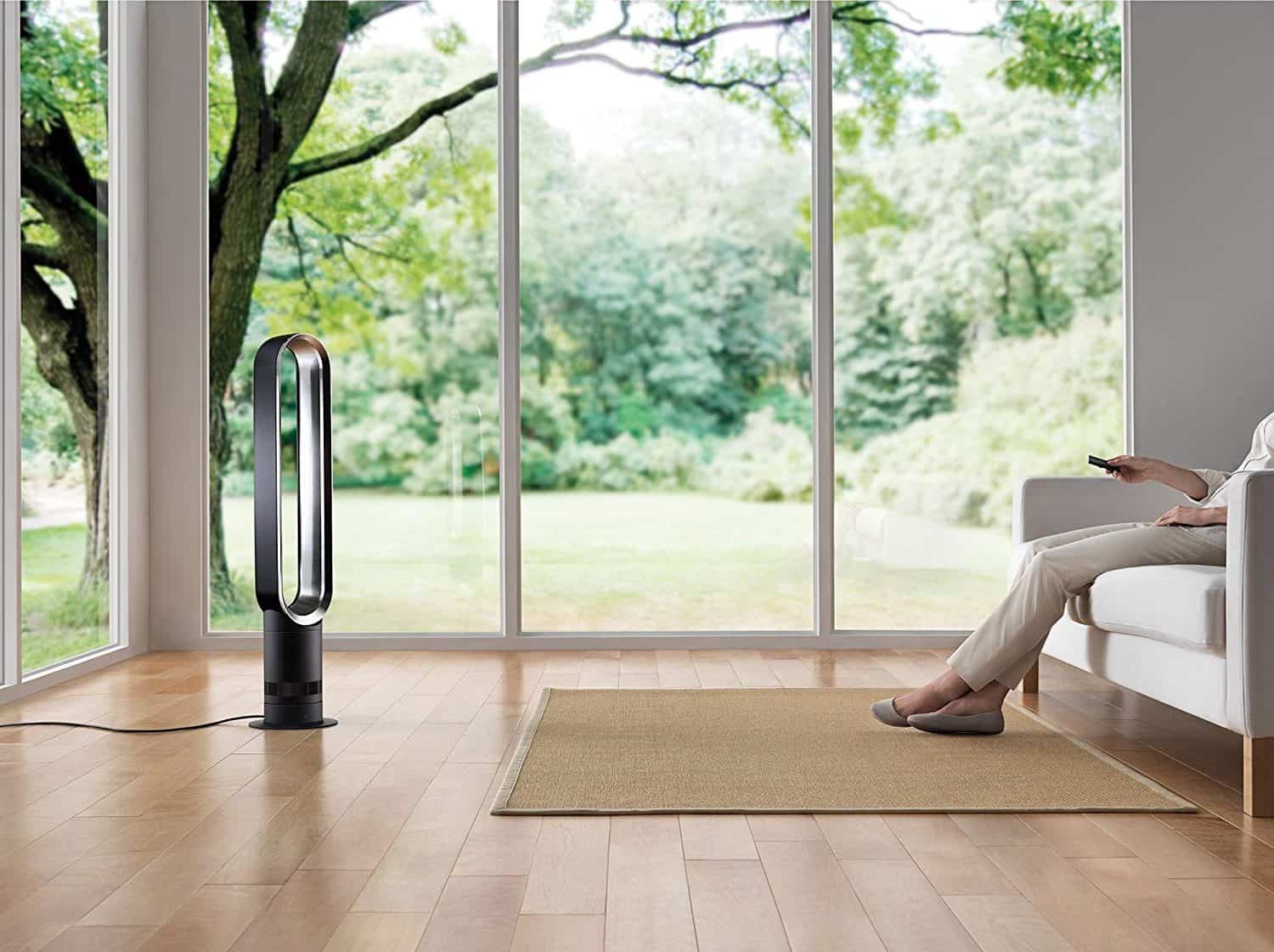
The best tower fan will keep you cool during those long summer months, but there are thousands of options. Let our buyer’s guide take the guess work out of it for you.
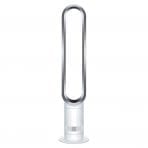 Dyson Air Multiplier AM07
Dyson Air Multiplier AM07
It’s very quiet
Easy to clean
Lightweight
10 airflow settings
Performs as advertised
The price tag
Lack of smart features
Limited controls on the unit
 Dyson Pure Cool Tower Fan TP04
Dyson Pure Cool Tower Fan TP04
600+ CFM
The Dyson app
Air quality readout
2-year warranty
Alexa compatibility
The price tag
Filters aren’t cheap
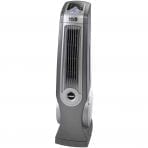 Lasko 4930 High-Velocity Fan
Lasko 4930 High-Velocity Fan
More powerful than it looks
Fully assembled
Vented design keeps the air cool
Very stable
7-8 pounds heavier than other models
Could be too noisy for some
Micro-blade design keeps things quiet
Plenty of power
Ease of use
Color won’t be for everyone
Basic features for the price
Mobile control
Ease of use
12-hour timer
The ability to change the height
Basic aside from Bluetooth
Wobbly
20-degree tilt
Less than 60 dBA on low
Easy to maintain
Safer than bladed models
Lack of onboard controls
Not as powerful as the AM07
It’s expensive
The price tag
It’s quieter than some models
Ease of use
Isn’t very powerful
Quality control
10 Terrific Tower Fan Reviews 2026

He works in a large company as an interior designer. Art critic and professional in the field of design.
Mingmei LiangKeeping cool in the summer can be a tough job, but it’s something the best tower fan can handle with ease. While they’re easy to find, more often than not you’ll be disappointed if you simply choose one off the shelf.
Well, we’re here to help you find the perfect fan for your needs. All our options are geared towards homeowners--although we think you’ll be pleasantly surprised by how much air some of these models can move for larger applications, too.
Tower fans are simple machines, so you don’t need a degree to use one. Unfortunately, that also means anyone with a webcam or keyboard can give you their opinion due to their simplicity and a low cost of entry.
Enter Bestazy.
To cut down on customer confusion, our experts dug through hundreds of fans to find the top models. We also took verified customer reviews into account along with our research and some personal experiences from several members of team Bestazy.
Our scores are calculated with care.
We’ve included a style and price point for anyone looking to stay cool.

When you’re in a rush or the middle of a heat wave, you may not have time to consider all the areas we’re going to discuss in our tower fan buying guide. While it can be tempting to pick up the first fan you see when the AC unit goes out, you’ll want to consider a few areas beforehand…
Consider the space of the room or area you need to cool along with the power of the fan. This measurement is listed in CFM, not horsepower or RPM. Space usually isn’t an issue thanks to the slender stature of tower fans, so focusing on features like oscillation filtration and noise levels should be high on your checklist.
While Dyson didn’t quite make our list of the best vacuums for stairs, their fans left a lasting impression with our experts and consumers alike.
The Air Multiplier AM07 has several advantages over other models and is an easy choice as our top option for the best fan.
If you’ve never seen one of Dyson’s fans, you’re in for a surprise.
They’re a “bladeless” devices with a unique design, making them safe around children and pets. It also utilizes the company’s Air Multiplier tech, something we’ll let Dyson explain for themselves…
Now that you know how it works, you can see why it’s such a popular option.
It can produce uninterrupted airflow and is extremely quiet to boot.
In fact, you won’t believe this:
The newer models are said to be 60% quieter than previous generations while consuming 10% less power.
Now that is something we can get behind.
The style of this tower fan certainly sets it apart, but it’s a functional design as well. The open face is easy to clean considering there are no blades to wipe down or grills to remove. We also like the “height to stand” ratio on this one as the stand doesn’t go halfway up the tower.
Overall, the fan measures 4.4” x 7.5” x 39.6” with a weight of only 6.3 pounds.
It has a 6.6-foot power cord, and the base is skinny at 5.9-inches.
We like how it leaves a small footprint behind.
You’ll definitely notice it as the fan tends to stand out, but it will not take up much room wherever it resides.
While the Dyson Cool AM07 is light and stylish, you’ll be surprised by the power. It’s not going to blow you across a room but can deliver around 580 CFM on its highest setting.
Why is that impressive?
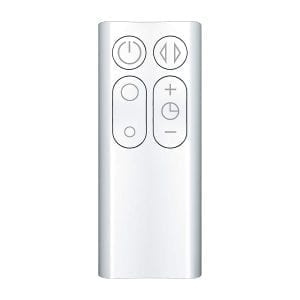 The bladeless design and size. It’s efficient, and ideal for small to medium-sized rooms.
The bladeless design and size. It’s efficient, and ideal for small to medium-sized rooms.
Most consumers found the Dyson AM07 easy to use except for the onboard controls.
While they aren’t difficult, they tend to blend into the housing and are limited so you’ll want to have the remote handy.
Thankfully, the curved remote gives you access to everything and is magnetized so you can stick it to the machine when not in use.
As for the features, this tower fan has ten airflow or speed settings that range from wild to mild. You can direct air through oscillation and set a sleep timer when it’s time to hit the hay.
Unlike some models, the AM07 timer ranges from 15 minutes to 9 hours so you can keep rooms cool for entire shifts.
You don’t have to worry about build quality with Dyson, and while their fans aren’t cheap, you get what you pay for.
In this case, that’s a sleek fan that’s quiet, safe, and efficient.
The fan comes with a 2-year warranty from the company, the aforementioned remote and a user guide to get you started.
It’s very quiet
Easy to clean
Lightweight
10 airflow settings
Performs as advertised
The price tag
Lack of smart features
Limited controls on the unit
No, you’re not doing a double take with the Dyson TP04.
While it resembles the AM07, the differences reside in the base. That’s where Dyson put their high-tech components along with a HEPA and activated carbon filters.
Whereas the AM07 only blows air, this tower fan also cleans it.
Pretty cool, right?
That’s far from the only difference between the two fans, however.
This one is the most high-tech machine on our list as well. The build quality is what you’d expect from Dyson as the AM04 is solid with a 6-foot cord and an 8.8-inch base. It’s 8.1-inches in diameter with a total height of 41.5-inches and a weight of 10.98 pounds.
It’s All About That Base…
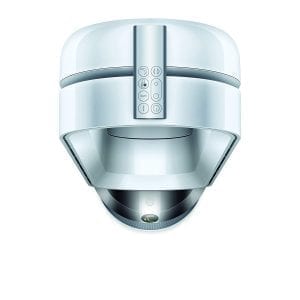 The base of the Dyson AM04 is where the filters are which make them very easy to access and clean.
The base of the Dyson AM04 is where the filters are which make them very easy to access and clean.
It’s a sealed system that uses a glass HEPA filter and an activated charcoal filter to give you double the filtration.
The HEPA filter is rated to snag 99.9% of allergens along with ultrafine particulates and VOCs.
Unfortunately, those filters may be a little hard to track down although you find the part numbers for anything you need in their user guide.
On the plus side, you don’t need to change them very often. The company recommends switching them out every 12-months if you use it for 12 hours a day or less.
Want to stay in the loop on the air quality?
The Dyson Link app can handle that and so much more.
While you’ll get a cool curved remote, you can use the app to control various features like speed and oscillation.
When it comes to sheer power, this fan’s rated for 700 gallons per second which shakes out to around 600 CFM.
The CADR or clean air delivery rate is listed at 90.
It won’t blow the covers off your bed, but it has more than enough volume for most folks with regular sized rooms.
Unlike its brethren, it has a backward airflow mode which purifies the air but doesn’t blow it towards you.
The Pure Cool Tower Fan has oscillation from 45 to 350-degrees and ten speed settings.
We love the machine’s “Night-time” mode which ensures you won’t be awoken by lights or sound.
We also dig the tiny display on the front of the unit which lets you check the air quality levels without accessing the mobile app.
Connectivity Is Key
Any machine or gadget that lets you use an app generally has Bluetooth. You’ll get that with the TP04, but you’ll also get Wi-Fi. That opens things up considerably by allowing you to control the fan away from home. It’s compatible with Alexa as well although you won’t be able to use her skills to order those filters, unfortunately.
The ability to make sure the air blowing your way is clean, sets the Dyson TP04 Pure Cool apart.
And it’s hard to argue with all the flagship features built into this one.
It’s the Cadillac of the fan world, but not without a few minor drawbacks.
That said, if you want a tower fan that purifies and is smarter than the rest, this one should be at the top of your list.
600+ CFM
The Dyson app
Air quality readout
2-year warranty
Alexa compatibility
The price tag
Filters aren’t cheap
When choosing a tower fan, one thing that can help thin the herd is design.
That’s what initially caught our eye with the Lasko 4930 High-Velocity Fan. After digging a little deeper, it became a lock for our list and is a tower fan you should consider as well.
The 4930 clocks in at 15.6 pounds and measures 35” x 12” x 8.75” so it’s safe to say it’s stout, but designed to be efficient.
That’s one thing many users agreed upon, and while it’s a bit heavy, this fan is still easy to move around thanks to the handle in the back.
Is it really a high-velocity fan?
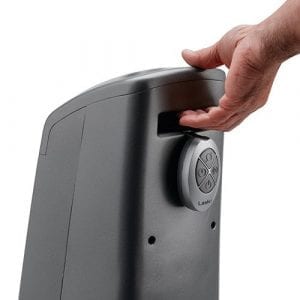 When you use the term “High Velocity” in the name of your fan, you’d better be sure it can live up to the hype.
When you use the term “High Velocity” in the name of your fan, you’d better be sure it can live up to the hype.
Unfortunately, Lasko wasn’t exactly forthcoming about the air power of the 4930. We managed to dig up the specs, however, and it tops out at around 400 CFM.
That’s respectable, and it moves enough air to qualify for the blower class.
This fan doesn’t tilt, but you’ll get oscillation to go along with 3-speed settings and a sparse timer that does 1, 2, and 4 hours.
Aside from a small remote and the company’s Blue Plug tech, which uses a safety fuse, that’s about all there is to see with this one.
While that may seem like a downer, the Lasko 4930 is meant to push air, not bowl you over with features, so the company kept things simple.
This is another case where the CFM rating doesn’t always tell the tale.
While the rating may seem low in comparison to other fans, it produces more air than taller models. You may not even need the high setting.
There are a few drawbacks.
It’s louder than others, but not necessarily distracting and as we mentioned, it’s heavy as well. You can get a rough idea of the sound levels from the user video below.
The Lasko 4930 High-Velocity Fan is only available in grey, but it’s reasonably priced and comes as a single unit or in packs of two or three.
You’ll get a 1-year warranty out of the box along with the remote a sparse user’s guide.
More powerful than it looks
Fully assembled
Vented design keeps the air cool
Very stable
7-8 pounds heavier than other models
Could be too noisy for some
Vornado may be fairly new on the scene compared to brands like Lasko and Honeywell, but they have made their presence felt in a short amount of time.
That’s due in part to fans like the Versa-Flow NGT33DC, a powerful machine with some interesting features.
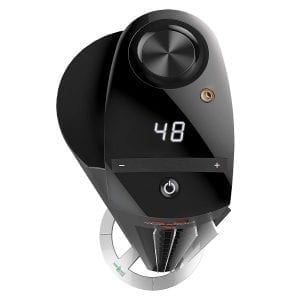 As you can see, the Vornado NGT33DC doesn’t look like a regular tower fan although it’s not as groundbreaking as the Dyson.
As you can see, the Vornado NGT33DC doesn’t look like a regular tower fan although it’s not as groundbreaking as the Dyson.
It’s mainly plastic like the rest of the pack, but well-made with vents running top to bottom. No space is wasted with this efficient design, and we like the fact the polarized power cord is longer than average at 7-feet.
Professor X would be proud of the stand keeping this fan upright. The 11-inch base keeps the 32-inch fan stable, and it tips the scales at around 7.5 pounds.
Inside that chassis, you’ll find a brushless DC motor and a series of 4.13-inch blades. The motor is energy efficient and capable of sending air up to 90-feet across the room.
That’s good, as there’s one feature you won’t find on the NGT33DC…
Do You Need Oscillation?
While oscillation is a feature found on 90% of tower fans, the company didn’t need it for this one. When combined with the motor and the adjustable vanes, their Versa-Flow system eliminates the need for rotation.
That saves on wear and tear, although that’s one thing you won’t have to fear with this particular model..
It has a 10-year guarantee!
In regards to the tech specs, the fan is rated at 440 CFM at its highest speed and 100 CFM on low. It’s quiet either way as the company claims it only produces 55 dBA on high and 30 on its lowest setting.
You will hear it on full power as witnessed in the video below, but it is quieter than other models of this size and speed.
The Vornado NGT33DC has a control system that allows you to finely tune the speed rate from 0 – 99. Granted, you won’t notice a huge difference in small increments, but it’s a nice touch nonetheless.
On that note, touch is how you’ll control this unit unless you use the remote.
The controls on the machine are sparse but gets the job done while the remote feels a bit cheap. You can find out a bit more about how this one works through the user manual.
You’ll find a standard timer on this tower fan which runs from 1 – 12 hours with an auto-off feature. It’s not exactly a dust magnet, but when it does get dirty the grill is easy to remove and clean.
Overall it’s an excellent fan with only a few minor drawbacks based on our research and hundreds of user reviews. It’s also available in a 42-inch model if you’re looking for something larger.
Outstanding 10-year warranty (U.S. only)
440 CFM
Sturdy base, well-built
Quiet
Great air flow
Cheap remote
No dimming feature
When you need full coverage from a tower fan, oscillation is the only way to go. If you want to ensure airflow reaches every corner of the room you’re trying to cool, we have just the thing for you.
It’s the Ozeri Micro-Blade Tower Fan which comes with 360-degree oscillation.
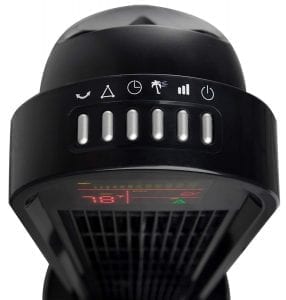 Finding a good fan with some pop is just half the battle, especially if you have a larger room that needs plenty of coverage.
Finding a good fan with some pop is just half the battle, especially if you have a larger room that needs plenty of coverage.
Well, the Ozeri 360 lives up to its namesake as it can swivel in a circle while hitting several key angles along with way. 360-degrees is an obvious option although you can choose from 60, 90, and 120-degrees as well.
At 38-inches, the 360 is a tall tower fan, but one that won’t eat up too much space as the base is only around 6-inches in diameter. It weighs 9 pounds and is fairly sturdy given its polycarbonate housing.
It has a flat front with a large multicolored LED display and a series of vents on the front that house micro-blades.
About That Display…
One of the first things you’ll notice with this tower fan is the massive colorful display. While great in the daytime, it can obviously be a hindrance at night if it’s in your bedroom.
You can dim the light from the remote control although you can’t completely kill it as you’ll see from this user video.
The readout gives you the scoop on the current temperature along with levels for various settings. There is a row of tactical buttons on the top as well.
Dimming is not included with the onboard controls, so be sure to stow that remote in the slot on the back when not in use.
Technical specifications were hard to come by for the Ozeri 360 Tower Fan, although the online user manual shed a bit of light on things.
We couldn’t find an accurate CMF rating although it’s quiet with three airflow patterns.
There are three-speed settings and an 8-hour timer that lets you set things up in 30-minute increments.
This tower fan has all the usual bells and whistles and is quite capable when it comes to producing air.
The 360-degree rotation is an obvious perk, and we like the large digital display although we wish it could be completely muted.
Users felt the Ozeri 360 was extremely easy to use and setup considering you only need three screws for the base. It’s only available in Black and comes with a 1-year factory warranty.
Micro-blade design keeps things quiet
Plenty of power
Ease of use
Color won’t be for everyone
Basic features for the price
Our second connected fan comes from an unlikely source in Ozeri. The ultra is tall and relatively quiet for its size with a design in line with dozens of tower fans.
What sets it apart are the features and an interesting accessory that allows you to extend its height.
At first glance, the Ozeri Ultra looks like a regular tower fan albeit one with a pole at the base. There’s a good reason for that, and it’s not just for the cosmetic appeal. Before we get to that pole, we want to talk about the build quality and the onboard controls.
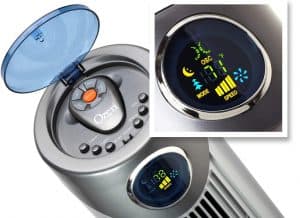 While the Ozeri Ultra isn’t a bad looking fan, the company made a few odd design choices. There is a color LCD panel on the front to give you the scoop on the stats, and a full array of buttons up top that are covered by a plastic panel.
While the Ozeri Ultra isn’t a bad looking fan, the company made a few odd design choices. There is a color LCD panel on the front to give you the scoop on the stats, and a full array of buttons up top that are covered by a plastic panel.
It’s easy to use but feels a little cheap, and it doesn’t help that it’s 10 pounds which magnifies an issue with the design.
This tower fan comes with an extension pole – something you don’t see every day. It allows you to extend the height from 32 to 42-inches but also makes the unit wobbly.
It’s not as top heavy as some units we tested, but worth mentioning as it’s more prone to tip over than models with a standard design.
Design aside, that’s the only real weak point on this fan. It comes with three airflow patterns with the standard speeds and can oscillate up to 90-degrees.
Like most manufacturers, the company claims this one is “whisper quiet” but failed to provide us with a dBA rating. Well, this video tells the tale as it is quiet in sleep mode, but only average on regular settings.
Ozeri wasn’t forthcoming with the tech specs on this fan, so we don’t have a CFM rating to rely on this time around.
If you want to dig a little deeper into the machine, we did locate an online user’s manual.
We can also tell you that it’s on par with budget-friendly fans in terms of power, so don’t expect to be blown away literally or figuratively. On the flip side, this particular fan is smarter than most…
Do You Own A Smartphone Or Slate?
If so, you’ll appreciate the Bluetooth connectivity. This allows you to sync up any Android or iOS-enabled mobile device and control the Ultra remotely. It’s a simple, but useful feature we’d like to see more of in the fan world and one that adds significant value.
Other features to note for the Ozeri Ultra include a 12-hour timer, temperature gauge, and a dimming function for that bold display.
As long as you’re not overly concerned about the fan tipping over, the Ozeri Ultra is well worth a look. While not ideal around wild pets or children, it performs as expected and we love any gadget for the home with built-in Bluetooth.
It comes with a remote, extension pole, and a warranty card that’s good for 1-year once you register the fan.
Mobile control
Ease of use
12-hour timer
The ability to change the height
Basic aside from Bluetooth
Wobbly
Most tower fans built for home use are around the 40-inch range aside from a few exceptions. One of them happens to come from Dyson in the form of the AM08.
It’s another bladeless fan although unique as it can do something the other models can’t.
As Dyson has expanded their fan lineup, we’ve seen some exciting devices hit the market.
The AM08 is one of the company’s larger fans, but not in a traditional sense...
It looks like someone put a small hula-hoop on the end of a pole. While it works in the same fashion as its bladeless brothers, it’s not quite as powerful as the AM07.
This was another fan we hard time finding reputable ratings for, but we estimate it to produce “around” 600 CFM on its highest setting. It has ten speeds and a sleep timer that lets you make adjustments in 15-minute intervals.
The timer goes up to 9 hours and can be controlled through the magnetic remote. It’s an easy machine to operate despite one major drawback.
Don’t Lose The Remote
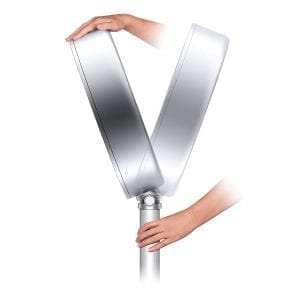 You can’t set the speed or anything else from the unit, so you’ll need to keep track of the remote. There’s not even a power button, so you would actually need to unplug it if the control goes missing.
You can’t set the speed or anything else from the unit, so you’ll need to keep track of the remote. There’s not even a power button, so you would actually need to unplug it if the control goes missing.
That’s a downer, and an odd choice considering the AM07 gives you a measure of control from the base and the TP04 has wireless connectivity.
Despite that drawback, this fan is well-built like the rest of Dyson’s products. It’s made from ABS and has a clean design that’s easy on the eyes.
The circular hoop measures 17-inches diameter which is larger than the 11-inch base. It’s not top heavy, however, and tips the scales at only 8.5 pounds.
As for the height, that’s what sets this fan apart from the rest of the crowd.
Go With The Flow…
Tower fans send air your way through a narrow channel of vents, whereas the Dyson AM08 allows you to control that airflow directly.
You can raise the fan up from around 46-inches to 55-inches from the floor to the top of the hoop. It can also tilt 20-degrees on its own center of gravity and oscillate up to 90-degrees as well.
Our experts and users of this fan also appreciate how simple it is to adjust as you can see in the video below.
This is one of Dyson’s more unique products, and while they whiffed in a few areas, it produces an ample amount of air. We love the fact it tilts as that’s something you won’t find elsewhere and you can say the same for its adjustable stature.
Many users we polled felt it was quiet and appreciated the smooth airflow as well.
The AM08 comes with a 2-year warranty, remote control, and a user’s guide.
Features
20-degree tilt
Less than 60 dBA on low
Easy to maintain
Safer than bladed models
Lack of onboard controls
Not as powerful as the AM07
It’s expensive
Honeywell is one of the more well-known manufacturers when it comes to cooling and heating.
They were a lock to make our list, and our first pick from the company is the HYF290B from their QuietSet lineup.
Remember What We Said About 3-Speed Settings?
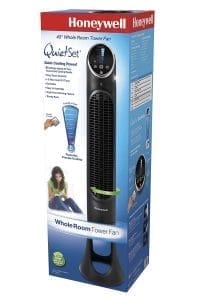 Well, that’s not the case with this tower fan.
Well, that’s not the case with this tower fan.
It has eight speeds which you can alter with the press of a button. They aren’t in the usual layout either so you can choose from settings like Power Cool, Calm, and Whisper in place of Low and High.
There are additional controls on the top of this unit as well. A “dimming” feature gives you control over the lights at night time and there are controls for the timer and oscillation as well.
If you prefer to stay stationary and let the fan do the work, you’ll be pleased to know the HYF290B comes with a handy remote control.
When not in use, you can stow said remote on the back of this unit.
The design of this tower fan is in line with the rest, so there are no big surprises in that regard. It does have a broader base than some, so it’s stable, but won’t break your back at 6.81 pounds. Honeywell used plastic in the build to keep things light.
While that’s a standard material, this isn’t the sturdiest tower fan we’ve seen and many consumers we polled feel the same way.
Numbers Can Be Misleading…
It measures 10” x 10” x 40” although the height should be taken with a dose of salt. The bottom and control panel at the top eat up some of the height, so it’s more like 30-inches.
Unfortunately, that’s not the only number that’s a bit off as those speeds are more about the noise level than actual air flow rates.
As mentioned, this fan has more settings than most, and it’s rated at 110 CFM. That pales in comparison to high-powered models like the Vornado 184 and its 550 CFM rating.
Needless to say, don’t be fooled by the numbers on this one as while it has plenty of settings, it does not produce nearly as much air as you’d think.
The Honeywell QuietSet HYF290B may be lacking in the power department, but it is effortless to use and easy to move from room to room. It comes with a standard 1-year warranty, but no real extras to speak of aside from the remote and a sparse user guide.
It’s available in White or Black with a 6-foot cord.
The price tag
It’s quieter than some models
Ease of use
Isn’t very powerful
Quality control
Where some companies struggle to produce one quality fan, Lasko cranks out dozens each year. The Lasko T48310 is one of their larger tower fans, and while it resembles a small skyscraper, we think you’ll be pleasantly surprised by its prowess.
The Xtra Air Performance Tower Fan is one of the biggest fans we’ve come across as its 48-inches high and weighs 15 pounds.
There’s a handle in the back when you need to tote it around your house, and it has the company’s patented Blue Plug technology for additional peace of mind.
It’s a load, but relatively stable given its height as it has a large round base.
Lasko is generally forthcoming about its fan specifications, but it took a while to find the CFM rating on this one which clocks in at around 550. You can expect plenty of flow form the T48310 Xtra Air, and it has a 7-hour timer along with oscillation.
It has three speeds--though the real highlight of this fan is under the hood.
What Else Can It Do?
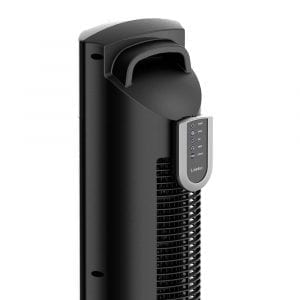 Buying a fan with filtration can raise the price tag considerably and also tends to cut down on the air power. Ionizers are an excellent alternative, and the Lasko T48310 has one of those built in.
Buying a fan with filtration can raise the price tag considerably and also tends to cut down on the air power. Ionizers are an excellent alternative, and the Lasko T48310 has one of those built in.
Simply put, an ionizer uses voltage and ions to clean the air instead of a traditional filter. While they do work, they can cause issues if they produce ozone or you have breathing issues.
You can learn a bit more about the pros, cons, and myths here.
This fan comes with the usual accessories out of the box including an owner’s guide and remote control.
It has a 1-year warranty against defects and will push plenty of air around a room. It’s our top choice if you have a higher bed and we feel it’s one of the better options when it comes to durability as well.
Produces a lot of air
Onboard controls
Well-built
Nice price tag
Could be too large for some
Louder than other options
Pelonis may not be a name many consumers are familiar with, but they managed to crack our list with an excellent fan. While it doesn’t have a fancy moniker or dozens of speeds, this tower fan won’t let you down on those hot summer days.
This tower fan from Pelonis is stylish with a modern look. The backside is clean and rounded while the front is ridged from top to bottom.
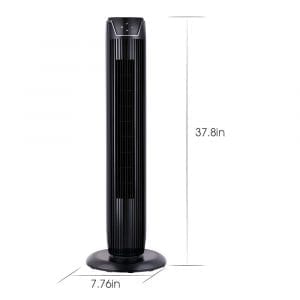 The actual vents don’t extend that far however so don’t count on 36-inches of venting. The fan is 5.7-inches in diameter with a wide, sturdy base and weighs 7.7 pounds.
The actual vents don’t extend that far however so don’t count on 36-inches of venting. The fan is 5.7-inches in diameter with a wide, sturdy base and weighs 7.7 pounds.
Given its dimensions, it’s definitely in the slim class.
Whether you’re trying to cool a room off during a 90-degree summer or just want to lower the temperature why you sleep, Pelonis has you covered.
The fan has 60-degree oscillation with 3-speed settings to go along with three modes normal, natural and sleep.
As you’d expect, you’ll get a small remote control although we’re pleased to say the onboard controls are top-notch on this one.
How Bright Are The Lights?
Two things that can ruin a good fan are noise and those cool, but sometimes annoying LED lights.
Most fans have at least a few lights on the body, and one can be enough to keep you awake at night if it’s too bright. This tower fan does not have a dimming feature, but you don’t need it.
Whenever you change a setting, the LED shuts itself off within 30-seconds.
The onboard controls for this unit sit on top while the LEDs are on the front. Overall it’s simple to use or tote around considering it’s only around 7 pounds.
There is a small storage spot in the back you can use for a handle or to store the remote as well. Last but not least is the timer, which you can set for up to 7 hours to keep you cool day or night.
The Pelonis Tower Fan is simple but effective and a nice alternative to other brands. We couldn’t find any information on its CFM rating or even an online product manual, but it comes with a standard 1-year warranty.
Simple to use
It’s well-built
Environmental/Noise modes are a nice touch
Limited features
Not as powerful as other models
If you’re opting for a vertical van, it may be due to space or safety concerns in your home. All of our picks are safer due to their vented design but can vary wildly in weight and height.
Size is just one factor to consider…
But before we get to that, we’re going to discuss power and speed.
Tower fans are not nearly as powerful as a floor fan or the best evaporative cooler.
It’s just a fact.
There are a few models out there that will surprise you, however as there’s more to those ratings found on the box or in your owner’s manual.
If you want to know how fast a fan can blow air, you need to key in on the CFM rating (cubic feet per minute) which tells you how much air it can move per minute. Sometimes it’s difficult to find, and it can also come in different measurements like gallons or liters per minute.
We’ve broken things down for you with our top choices, but like most measurements of this nature, you’ll want to take them with a dose of salt.
While the ratings may be perfectly legit, those companies don’t tell you the distance between the fan and the airflow meter taking the measurement.
As you can imagine, that makes a huge difference along with other factors.
The overall design of the tower fan plays a large part in how air circulates as well. Even a machine with narrower vents can suffice if it oscillates or has other flow adjustments built in. The size of the room you’re trying to cool matters as well, but most tower fans are rated to cool single rooms… not entire homes or huge open areas.
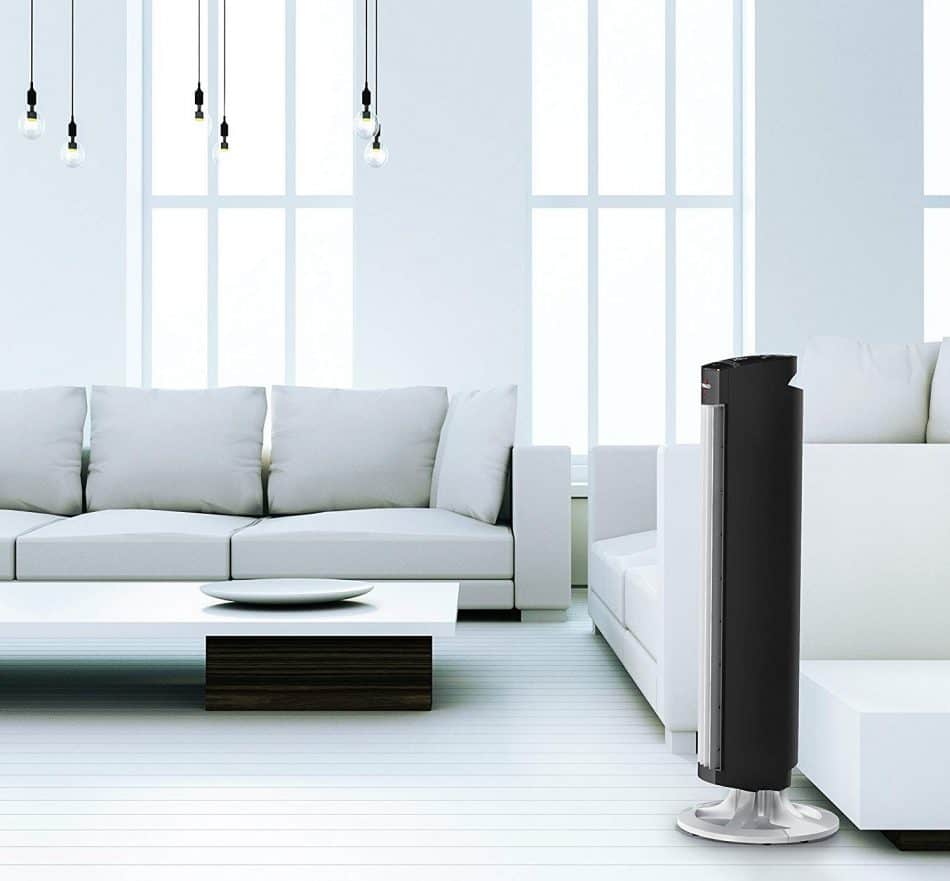
Looking for a fan that gives you 20 settings for speed and won’t break the bank?
Well, don’t hold your breath.
Most tower fans are limited in the speed department. Three speeds are standard with low, medium, and high–although Dyson and others up that number considerably.
Unfortunately, this is another deceptive area for consumers considering some manufacturers seem to “confuse” the levels with speeds these days.
Here’s the deal:
If a fan manufacturer mentions “levels or patterns” they typically don’t mean speed.
It’s more of an environmental mode or sorts that dials the decibel levels down so you can talk over a fan or catch a little shut eye.
While handy, how well these modes work varies wildly across the board. In other words, don’t get caught up in the marketing hype.
Simply put, if you require higher speeds, it’s going to cost you in more ways than one.
In the course of our research, we found it was difficult to find a reliable tower fan with over 3 to 4-speeds. Anything above those numbers on basic models is like finding a unicorn in the wild. The other area where you’ll pay the price is something that could potentially keep you up at night.
Fans are different from AC units as they don’t “cool” air in most cases. They just push it around the room. They’re ideal at creating artificial breezes, but the faster the blades turn, the more noise they tend to produce.
If you plan to use the fan in your bedroom while you sleep, you’ll want to make sure it has a low decibel level. This is another tricky rating to dig up, so we’ve included several examples of fans in action to give you an idea on noise levels.
There is no magic number to shoot for on the decibel chart either as it comes down to your needs along with those of your partner.
While nobody wants to scream over a fan to be heard in daylight or darkness, it’s not the only issue that can cause a restless night’s sleep. Those fancy controls on the tower are usually illuminated which can be a massive problem in pitch black rooms. If you’ve ever experienced the “LEDs of Insomnia” you already know what we mean.
An easy solution to this particular problem is to pick up a set of LightDims, but it may not be necessary if the unit has built-in dimming.
It’s one feature that’s hit or miss on tower fans, although something we feel should be standard across the board. As always, when you become stuck between several models, there is only one place to turn…
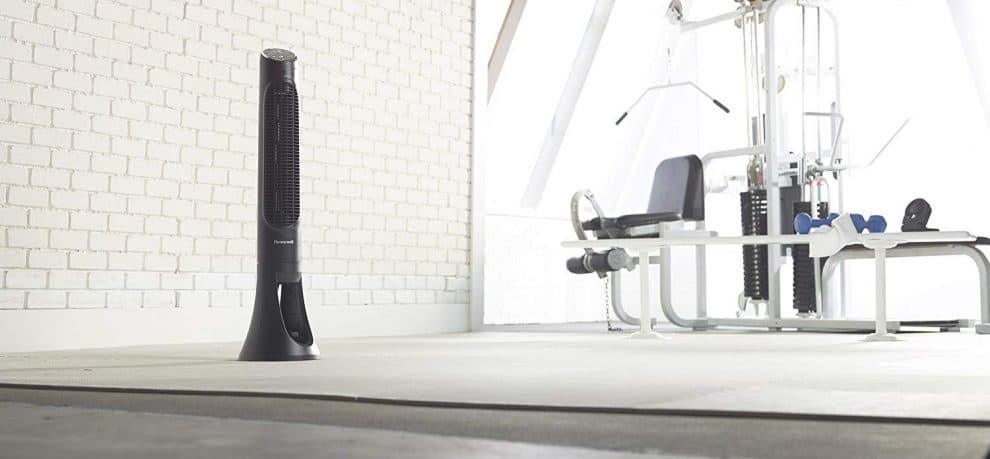
It’s safe to say fans are not the most exciting device for your home as they don’t entertain you and can’t tell you a joke like Alexa or Google Home.
While they will keep you comfy, they usually don’t have a lot of pizazz.
This holds true in the feature department as well, so we’re going to quickly cover the most common options you’ll find on tower fans today.
The most common feature on fans is also the simplest – a timer.
This allows the fan to run for a predetermined time before shutting itself off. How long you get varies across the board. Some models only give you a few hours while others let you go half the day.
Fans are stationary objects by nature, even if a high-powered unit on wheels would be fun.
When you need a tower fan with broad coverage, adjustable louvers help but won’t replace oscillation. It’s another common feature although the amount of coverage can be anywhere from 30 to 360-degrees.
Both of those features are crucial in many cases, but if you really want to take things to the next level, here are a few things you’ll want to look for…
Do you have an older home? How about pets… do you have a feline friend or a couple of dogs? If you answered yes to either question or just have allergy issues, you may want to consider a tower fan with filtration.
While you can find filters in all the best vacuum cleaners or even cheap shop vacs, they are not common in tower fans. They can make a huge difference in the air quality in a room or throughout your home, however, and maybe something you’ll want high on your checklist.
Consumers looking to keep dander smoke and fine particulates at bay will want HEPA filtration. It’s the best, and while charcoal and foam-based solutions are also options, they don’t hold a candle to a good HEPA filter.
If you do choose a fan with filtration, keep an eye out for the CADR rating as well. This tells you how much “clean” air is cranked out and is generally lower than the overall CFM rating sans the filter.
Ionizers are another uncommon option, and so are machines that tilt.
The latter is mainly due to tip-over concerns, but Dyson and a few other companies have come up with some interesting solutions. Some of these features add incredible value to a product while others could make the fan more trouble than it’s worth.
It’s safe to say fans are not very complicated to use.
On most models, you’ll have a power button and a few others for features like a sleep timer or oscillation. You don’t need to be a rocket scientist to operate one but should still have ease of use on your mind.
How are the buttons laid out on the unit… are they touch-based or tactile?
Little things can make a big difference if you’re stumbling around in the dark. You would also be surprised by how many fans forgo buttons for speed or oscillation on the unit itself.
While remote controls are handy, they can be very easy to lose, and replacements tend to be expensive or hard to find on older models. In a nutshell, make sure the tower fan has all the essential controls onboard unless you’re the Sherlock Holmes of your household.
A unit with hundreds of vents and a unique design may look cool, but will it be easy to clean?
Fans get dusty, and unless you want to blow dust around the room, you’ll need to keep them clean. The design of the tower fan is critical in this regard as you could spend 5-minutes or a few hours trying to get in all the nooks and crannies.
On the flip side, filters are easy to replace, and there is little to no maintenance on those funky bladeless models.
When you’re concerned about build quality, there are still a few steps you can take despite buying online.
First of all, look at the fan itself… is it dainty or built like a tank?
On average, tower fans come with a 1-year warranty, so anything beyond that is a bonus.
Customer support should be taken into account along with the warranty. Plenty of household goods come with thin manuals, and you’re unlikely to find an online help forum dedicated to a budget-friendly fan.
By design, most tower fans are safer than larger box fans or other styles as the blades are enclosed.
This keeps tiny fingers from getting in the way.
Or tails if you have pets.
On the flip side, Dyson fans don’t have blades at all and look more like a fancy air purifier or ionizer than a tower fan.
When it comes to tipping over, thing’s change as these fans are taller and can tip over rather easily if bumped. The taller they are… the harder they can fall unless they have a wide, sturdy base.
Even if the outer shell is made of heavy-duty plastic, there’s a good chance it will crack when it hits the floor.
Even if it doesn’t, something inside the fan could pop loose which could result in noise or a complete failure to function.
While that would be a downer, it’s better than the fan falling on top of your cat or child. The heaviest fan on our list is only around 15 pounds, but it will definitely leave a mark if it crashes into your head or someone else’s.
The only tips we have against fans tipping over is to pay attention to the size of the base.
That’s the first line of defense although cord length and placement should be taken into account as well.
You don’t need to tie the fan off to a wall, but it pays to be safe unless you plan on putting the warranty to the test.
As we’ve said, fans are not complicated to operate.
Anyone can pull one out of the box and put it into action.
They’re also made to last, so maintenance is usually the last thing on most consumers’ minds. Well, that’s a mistake if you want your fan to perform like a champ.
While cleaning a tower fan is relatively simple, the design of some units can throw you for a loop. Dust is the first thing you’ll need to deal with and can be tough to remove if there are dozens of vents and channels.
This is where a vacuum hose comes in handy.
Or my personal favorite, the Swiffer Duster, which allows you to get into tight spots with ease.
Bladeless fans are even easier to clean considering you simply need to wipe them down. If the machine has a filter, refer to your owner’s manual and make sure you change it regularly.
We also highly advise you never to remove the grill or front from the fan, no matter how tempting it may seem.
Unless the manufacturer recommends it, never take your tower fan apart.
Now that you know what to look for, we hope you found the best tower fan to keep you cool when the weather gets hot.
If you’re still on the fence, just remember our buying tips and consider the “tip over” factor if you have children or pets in your home.
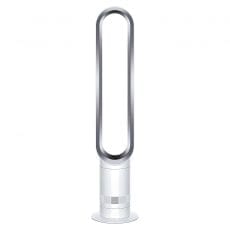
The best tower fan will keep you cool during those long summer months, but there are thousands of options. Let our buyer’s guide take the guess work out of it for you.
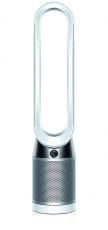
The best tower fan will keep you cool during those long summer months, but there are thousands of options. Let our buyer’s guide take the guess work out of it for you.
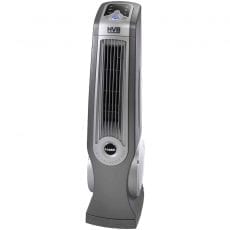
The best tower fan will keep you cool during those long summer months, but there are thousands of options. Let our buyer’s guide take the guess work out of it for you.
Definitely and that’s not just a myth. These types of fans don’t “cool” the air; they just circulate it so using the two together gives you a wind chill effect indoors.
While that depends on the manufacturer, you typically only need a Philips head screwdriver. If a fan has filters, some additional work may be required, but more often than not you only need to attach the base.
Good question as that all depends on the model along with its age. Manufacturers tend to roll out the same designs year after year, so replacement parts will be easy to find for popular models. Once the warranty is up, or it becomes discontinued… it’s a different story.
